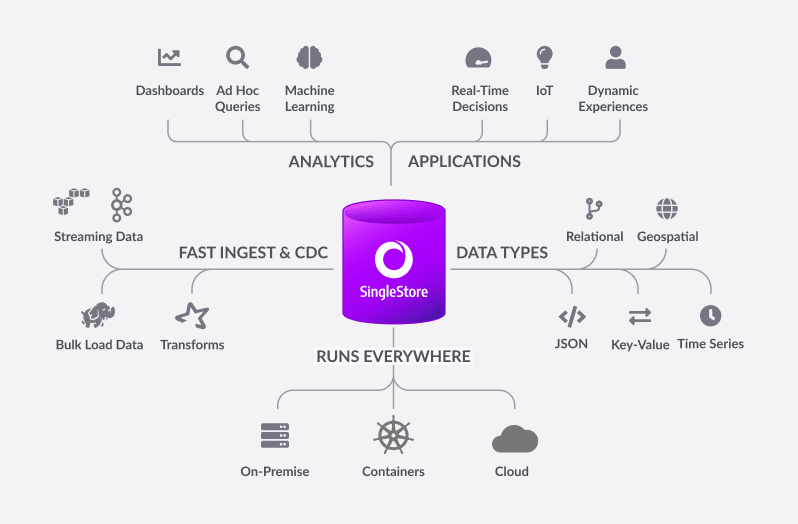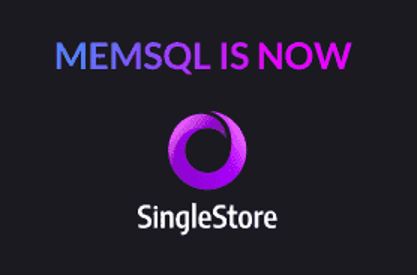SingleStore is a cloud-native database that is designed for data-intensive applications. It is a distributed, relational, SQL database management system (RDBMS) that features ANSI SQL support. SingleStore is known for its speed in data ingest, transaction processing, and query processing.
SingleStore was founded in 2011 by a team of engineers from Facebook. The company is headquartered in San Francisco, California. SingleStore has raised over $460 million in funding from investors such as Goldman Sachs, Prosperity7 Ventures, and Accel.
SingleStore is used by a wide range of companies, including Hulu, Uber, and Comcast. The company’s customers use SingleStore for a variety of applications, such as real-time analytics, machine learning, and operational databases.
SingleStore is a good choice for organizations that need a fast, scalable, and reliable database for data-intensive applications. The company’s cloud-native architecture makes it easy to deploy and manage, and its ANSI SQL support makes it easy to use for existing applications.
Here are some of the key features of SingleStore:
- Speed: SingleStore is one of the fastest databases on the market. It can ingest data at up to 100 GB per second and query data at up to 100,000 transactions per second.
- Scalability: SingleStore is highly scalable. It can be deployed on-premises or in the cloud, and it can scale to support billions of rows and terabytes of data.
- Reliability: SingleStore is a highly reliable database. It is designed to be fault-tolerant, and it can withstand even the most demanding workloads.
- Ease of use: SingleStore is easy to use. It supports ANSI SQL, so it can be used with existing applications.
In addition to these key features, SingleStore also offers a number of other features, such as:
- Real-time analytics: SingleStore can be used to perform real-time analytics on large datasets. This makes it a good choice for applications that require fast insights into data.
- Machine learning: SingleStore can be used to train and deploy machine learning models. This makes it a good choice for applications that require predictive analytics.
- Operational databases: SingleStore can be used as an operational database. This makes it a good choice for applications that need to store and process large amounts of data in real time.
Overall, SingleStore is a powerful database that is well-suited for a wide range of data-intensive applications. It is fast, scalable, reliable, easy to use, and offers a variety of features that make it a good choice for organizations of all sizes.
Founding History of SingleStore
SingleStore, formerly known as MemSQL, has an interesting founding story that showcases the vision and innovation behind the company. Let’s delve into the details.
Founders Eric Frenkiel, Nikita Shamgunov, and Adam Prout established MemSQL in 2011 with the goal of creating a high-performance database capable of handling both real-time analytics and operational workloads. The founders recognized a growing need for a database solution that could process and analyze large volumes of data in real-time, as traditional databases struggled to provide the necessary speed and scalability.
The initial idea for MemSQL originated during Frenkiel and Shamgunov’s time at the Massachusetts Institute of Technology (MIT), where they worked together on a research project involving distributed systems and databases. Their work provided them with valuable insights into the challenges faced by enterprises in managing and processing vast amounts of data.
Frenkiel and Shamgunov teamed up with Prout, a former colleague from Facebook, to bring their vision to life. Leveraging their expertise in database systems, they set out to build a next-generation database platform that could deliver real-time analytics capabilities while maintaining the scalability and reliability required by modern businesses.
To fund their venture, the founders secured seed funding from Y Combinator, a renowned startup accelerator. This initial investment allowed them to establish MemSQL and embark on the development of their groundbreaking database technology.
MemSQL quickly gained attention and attracted additional funding from reputable venture capital firms. In 2011, the company secured $2.1 million in a seed funding round led by First Round Capital and New Enterprise Associates. This investment helped fuel the company’s growth and development efforts.
In the subsequent years, MemSQL continued to refine its technology and expand its customer base. The company positioned itself as a leading provider of real-time, in-memory database solutions, attracting clients from various industries such as finance, e-commerce, and telecommunications.
In 2013, MemSQL secured a Series B funding round, raising $35 million in investment led by Accel Partners. This funding allowed the company to accelerate its product development and market expansion, enabling it to reach a wider audience with its innovative database platform.
As MemSQL gained traction in the market, it garnered recognition and accolades from the tech industry. The company received multiple awards, including being named a Cool Vendor in In-Memory Computing by Gartner in 2014.
In 2019, MemSQL rebranded itself as SingleStore, reflecting its evolving product offerings and expanding scope beyond pure in-memory technology. The name change also highlighted the platform’s ability to handle both operational and analytical workloads, positioning SingleStore as a comprehensive solution for real-time data processing and analysis.
Since its founding, SingleStore has continued to grow and innovate. The company has released new versions of its platform, introducing features like distributed SQL, support for cloud deployments, and enhanced integrations with popular analytics tools. SingleStore’s customer base has expanded to include global enterprises, and the company has forged partnerships with technology leaders like Google Cloud and Amazon Web Services (AWS).
Overall, SingleStore’s founding story exemplifies the entrepreneurial spirit and technical expertise of its founders. Their vision for a high-performance database platform capable of real-time analytics has propelled the company to become a prominent player in the data management and analytics space.
Business Model of SingleStore
SingleStore’s business model revolves around providing a high-performance, distributed, in-memory database platform that enables organizations to process and analyze large volumes of data in real-time. Let’s dive into the details of SingleStore’s business model.
Product Offering: SingleStore offers a software platform that combines transactional and analytical processing capabilities. The platform is designed to handle structured and semi-structured data and provides a unified SQL interface, making it compatible with existing applications and tools. It leverages an in-memory architecture to deliver fast data access and processing speeds, enabling real-time analytics and operational reporting.

Licensing Model: SingleStore follows a subscription-based licensing model. Customers pay a recurring fee to access and use the SingleStore platform. The pricing structure typically depends on factors such as the number of nodes, data size, and required features. SingleStore offers different subscription tiers to cater to the varying needs and scale of its customers.
Enterprise Customers: SingleStore primarily targets enterprise customers across various industries, including finance, e-commerce, telecommunications, advertising, and more. These organizations typically deal with large volumes of data and require real-time analytics capabilities to gain valuable insights and make data-driven decisions. SingleStore’s platform aims to address their needs by providing a high-performance database solution that can handle their demanding workloads.
Cloud and On-Premises Deployment: SingleStore supports both cloud-based and on-premises deployment options, giving customers flexibility in choosing the deployment model that suits their requirements. Customers can choose to deploy SingleStore on major cloud platforms such as Google Cloud, Amazon Web Services (AWS), and Microsoft Azure. Additionally, they have the option to deploy SingleStore on their own infrastructure.
Partnerships and Ecosystem: SingleStore has established strategic partnerships with leading cloud providers and technology vendors. These partnerships enable seamless integration and interoperability with complementary technologies, expanding the ecosystem around SingleStore’s platform. For example, SingleStore has partnerships with Google Cloud and AWS, allowing customers to leverage the database platform within their cloud environments.
Professional Services: In addition to its software platform, SingleStore offers professional services to assist customers with implementation, optimization, and support. These services may include training, consulting, and technical assistance to ensure customers can effectively leverage the SingleStore platform and maximize its benefits.
Continuous Innovation: SingleStore invests in research and development to enhance its platform’s capabilities and stay ahead of evolving market needs. The company releases regular updates and new versions of its software, introducing features like distributed SQL, cloud-native enhancements, and integrations with popular analytics tools. Continuous innovation allows SingleStore to provide value to its customers and maintain a competitive edge in the database market.
In summary, SingleStore’s business model revolves around providing a subscription-based, high-performance database platform for real-time analytics and operational workloads. By targeting enterprise customers, offering flexible deployment options, building strategic partnerships, and providing professional services, SingleStore aims to deliver a comprehensive solution that enables organizations to unlock the full potential of their data.
Revenue Model of SingleStore – How does SingleStore make money?
SingleStore generates revenue through its subscription-based licensing model and additional revenue streams. Let’s explore the revenue model of SingleStore in detail:
Subscription Licensing: SingleStore primarily generates revenue through its subscription licensing model. Customers pay a recurring fee to access and use the SingleStore platform. The pricing structure is typically based on factors such as the number of nodes, data size, and required features. SingleStore offers different subscription tiers to cater to the varying needs and scale of its customers. The subscription model ensures a steady revenue stream for the company as customers continue to renew their subscriptions.
Cloud Consumption: As SingleStore supports deployment on major cloud platforms like Google Cloud, Amazon Web Services (AWS), and Microsoft Azure, the company can generate revenue through cloud consumption. Customers who deploy SingleStore on these cloud platforms may incur usage-based charges from the cloud providers, and SingleStore receives a portion of those charges as revenue. This revenue model aligns with the growing trend of organizations adopting cloud infrastructure for their data management needs.
Professional Services: SingleStore offers professional services to assist customers with implementation, optimization, and support. These services may include training, consulting, and technical assistance. By providing professional services, SingleStore can generate additional revenue beyond its core software licensing. Customers who require specialized support or desire expert guidance in leveraging the SingleStore platform may engage with these professional services, which contribute to the company’s revenue.
Partnerships and Alliances: SingleStore collaborates with strategic partners, including cloud providers and technology vendors, to expand its ecosystem and create new revenue opportunities. Through partnerships, SingleStore can integrate its platform with complementary technologies, unlocking additional value for customers. Partnerships can involve revenue-sharing arrangements, joint marketing efforts, or bundling SingleStore’s platform with partner offerings, resulting in revenue generation through mutual business collaborations.
Upselling and Cross-selling: SingleStore has the potential to generate revenue through upselling and cross-selling activities. As the company continuously innovates and introduces new features and capabilities, existing customers may upgrade their subscriptions to higher tiers, providing increased functionality or scalability. Additionally, SingleStore can cross-sell its professional services to customers who have already adopted the platform but require additional support or customization.
Enterprise Support: SingleStore offers enterprise-level support options for customers with mission-critical deployments or specific service-level agreements (SLAs). These premium support offerings provide customers with priority access to technical assistance, faster response times, and dedicated support personnel. Enterprise support is typically provided at an additional cost, generating revenue for SingleStore while catering to the needs of customers who require enhanced support and service guarantees.
Also Read: Klarna – Founders, Business Model, Investors, Growth & Future
To read more content like this, subscribe to our newsletter
Go to the full page to view and submit the form.

